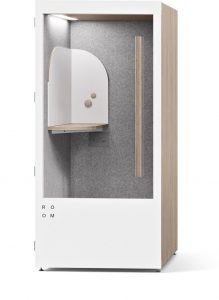We caught up with Brian Chen, co-founder of ROOM, to find out how where the initial idea came from, what Brian has learnt and what’s in-store for ROOM in the future.
Why was the business started?
My co-founder Morten and I came up with the idea for ROOM largely as a result of our own personal pain points while working in various open-plan offices. We were frustrated with having to go outside to take calls, struggling to find somewhere private to speak to colleagues, or even just somewhere quiet to work. We also realized there was a clear gap in the market for a brand that truly resonates with the modern workforce, puts people first, and promotes a healthy work environment.
So, we set out to fix this by building a cost-effective solution that would provide space for privacy and focused work without having to revert to the old days of cubicles and corner offices. The result was our inaugural product, an award-winning, soundproof phone booth that is flexible and easy to move around. The success of the Phone Booth has propelled us towards a conversation around the core of what people need from their offices and how we can fundamentally improve the spaces in which millions of people around the world work. ROOM’s long-term goal is to offer solutions that create room for people and empower the worker in the modern workspace.

How does ROOM differ?
ROOM takes an entrepreneurial, data-driven approach to office design. We want to replace expensive and wasteful construction with simple, functional design that fits into any space and doesn’t compromise on quality. Our phone booths ship flat directly to businesses, take less than an hour to assemble, and can be easily disassembled if you need to move them around. This flexibility enables businesses to easily adapt their workspaces as their needs change over time.
Additionally, sustainability is at the heart of everything that we do. From design and manufacturing to final delivery and end user experience, we’ve thought about sustainability every step of the way. Each one of our flagship phone booths uses soundproofing materials made out of 1,088 recycled plastic bottles. At the start of 2020, we joined Flexport’s Carbon Offset Program in partnership with Carbonfund.org, which allows us to be carbon neutral by offsetting 100% of our global logistics CO2 emissions.
What have you learnt over the course of growing the business?
When we started out, people were sceptical about whether an eCommerce-driven direct sales business model could take off in the office furniture space, which has traditionally been dominated by long-standing office furniture manufacturers and dealers. However, we’ve since come to appreciate that the way people want to buy things for their businesses really isn’t that different to how they’d want to buy things for themselves, and that even a B2B transaction has a human at the other side of it. The success we’ve had with the phone booth has validated our approach, and reinforced our desire to create a consumer-like purchase experience for businesses looking to furnish their offices.
Over the last few months specifically, we’ve witnessed a growing need for flexible and adaptive solutions to allow businesses to react to the circumstances they find themselves in. The fact is that many offices pre-pandemic were already in need of reinventing, and COVID-19 has only accelerated that timeline. ROOM’s modular solutions help offices enforce social distancing, de-densify if needed, and generally adapt as needs change.
What are ROOM’s plans for growth?
In the last year, ROOM has doubled its customer base, and reached $30 million in revenue. Having achieved significant growth in the US, working to transform the office spaces of organisations like Uber, NASA, Amazon, Nike and Google, we decided to launch ROOM to the European market last year.
Now, as our working lives have been indefinitely transformed by COVID-19, we’re at a point where everyone is rushing to figure how we can better design offices. All of a sudden people are realising that we need to have workspaces that can adapt to rapid change. As we continue to expand our product suite we want to lead the way for businesses looking for ways to redesign their workspaces to be configurable, flexible and healthy for employees.
We’re thinking larger and we’re thinking modular. What we’ve brought to market is the ‘privacy in an open office’ concept, and this concept extends way beyond the phone booth so there’s certainly more to come.



